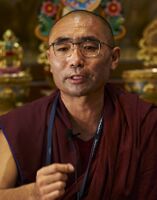Kalsang Tenkyong, Sera Je Geshe: Difference between revisions
No edit summary |
No edit summary |
||
| (6 intermediate revisions by 2 users not shown) | |||
| Line 1: | Line 1: | ||
{{Person | {{Person | ||
|MainNamePhon=Geshe Kalsang Tenkyong | |MainNamePhon=Geshe Kalsang Tenkyong | ||
|SortName=Kalsang Tenkyong, Sera Je Geshe | |||
|MainNameTib=དགེ་བཤེས་སྐལ་བཟང་བསྟན་སྐྱོང་། | |MainNameTib=དགེ་བཤེས་སྐལ་བཟང་བསྟན་སྐྱོང་། | ||
|PersonType=Authors of Tibetan Works; Geshes | |PersonType=Authors of Tibetan Works; Geshes | ||
|bio= | |bio=At the age of 13, he joined Shugding Monastery in Tibet and memorized prayers and ritual texts. When he was 20, he joined Sera Monastery in Lhasa and learned language and logic. At 23, he left Tibet and arrived at Sera Monastery in India to pursue education in Buddhist studies. He stood 3rd in his exams on the Middle Way and Perfection Studies and carried out research on logic and epistemology as part of his Lharam Geshe training and sat the exams for it. He also stood 3rd in the examination in tantric studies. In 2020, he sat in the final defense for the Lharam Geshe degree. In addition to his regular academic achievements, he also won the first prize in a literary competition in Tibet, was the sole prize winner for literary composition during the international commemoration of Tsongkhapa, and also received many other prizes for literary writings. He served as the 11th President of the Khampa Literary Society and has authored many works including a commentary on ''Pramāṇasiddhi'' and two books of poetry entitled ''Sweets of the Mute.'' He is currently a researcher. | ||
|bioTib=དགེ་བཤེས་ལྷ་རམས་པ་སྐལ་བཟང་བསྟན་སྐྱོང་། (སྨྱུག་མིང་དར་ལྕེ་ཟད་པོ།) སེ་ར་བྱེས། དགུང་ལོ་ ༡༣ ་ལ་ཤུག་ལྡིང་དགོན་ལ་ཞུགས་ནས་འདོན་ཆོག་མང་པོ་བློ་འཛིན་དང་། དགུང་ལོ་ ༢༠ ་ལ་ལྷ་ལྡན་སེ་རྭ་དགོན་ལ་ཞུགས་ནས་མཚན་ཉིད་གཞུང་དང་བོད་ཀྱི་རིག་གནས་བཅས་སྦྱངས། དེ་ནས་ལོ་ ༢༣ ་ལ་བཙན་བྱོལ་དུ་འབྱོར་ནས་སེར་བྱེས་གྲྭ་ཚང་ལ་ཞུགས་ནས་གཞུང་ཆེན་སློབ་གཉེར་བྱས་པས་དབུ་ཕར་རབ་འབྱམས་པ་རྩེ་ཕུད་གསུམ་པ་ཐོབ། ལྷ་རམས་ཚད་མ་རིག་པ་ཉམས་ཞིབ་པའི་རྩོམ་རྒྱུགས་ཕུལ་བ་དང་། སྔགས་ཀྱི་རྩོད་རྒྱུགས་ཆེན་མོ་རྩེད་ཕུད་ཨང་གསུམ་པ་ཐོབ། ཕྱི་ལོ་ ༢༠༢༠ ་ལོར་ལྷ་རམས་དམ་བཅའ་བཞག བོད་ནས་སྙན་རྩོམ་འགྲན་བསྡུར་ཞིག་ལས་བྱ་དགའ་ཨང་དང་པོ་དང་། རྒྱལ་སྤྱིའི་ཙོང་ཁ་པ་རྗེས་དྲན་ལོར་སྙན་རྩོམ་དང་དཔྱད་རྩོམ་བྱ་དགའ་གཉིས་ཁོང་གཅིག་པུས་ཐོབ་པ་དང་། སྔ་ཕྱི་རྩོམ་ཡིག་འགྲན་བསྡུར་ལས་བྱ་དགའ་ཐེངས་མང་པོ་ཐོབ་ཅིང། སྐབས་བཅུ་པའི་ཁམས་པའི་སྨྱུག་ཚོགས་ཀྱི་ཚོགས་གཙོ་གནང་ཞིང་། བརྩམས་ཆོས་ “ཚད་མ་གྲུབ་པའི་འགྲེལ་པ་ཐར་ལམ་འཇུག་ངོགས་” དང་། སྙན་རྩོམ། “ལྐུགས་པའི་བུ་རམ་” ཞེས་པ་དེབ་ཕྲེང་གཉིས་ཡོད། ད་ལྟ་ཉམས་ཞིབ་གནང་བཞིན་བཞུགས།། | |||
At the age of 13, he joined Shugding | |images=File:Kalsang Tenkyong.jpg | ||
|pagename=Kalsang Tenkyong, Sera Je Geshe | |pagename=Kalsang Tenkyong, Sera Je Geshe | ||
}} | }} | ||
Latest revision as of 11:58, 20 June 2023
| PersonType | Category:Authors of Tibetan Works Category:Geshes |
|---|---|
| MainNamePhon | Geshe Kalsang Tenkyong |
| MainNameTib | དགེ་བཤེས་སྐལ་བཟང་བསྟན་སྐྱོང་། |
| SortName | Kalsang Tenkyong, Sera Je Geshe |
| bio | At the age of 13, he joined Shugding Monastery in Tibet and memorized prayers and ritual texts. When he was 20, he joined Sera Monastery in Lhasa and learned language and logic. At 23, he left Tibet and arrived at Sera Monastery in India to pursue education in Buddhist studies. He stood 3rd in his exams on the Middle Way and Perfection Studies and carried out research on logic and epistemology as part of his Lharam Geshe training and sat the exams for it. He also stood 3rd in the examination in tantric studies. In 2020, he sat in the final defense for the Lharam Geshe degree. In addition to his regular academic achievements, he also won the first prize in a literary competition in Tibet, was the sole prize winner for literary composition during the international commemoration of Tsongkhapa, and also received many other prizes for literary writings. He served as the 11th President of the Khampa Literary Society and has authored many works including a commentary on Pramāṇasiddhi and two books of poetry entitled Sweets of the Mute. He is currently a researcher. |
| bioTib | དགེ་བཤེས་ལྷ་རམས་པ་སྐལ་བཟང་བསྟན་སྐྱོང་། (སྨྱུག་མིང་དར་ལྕེ་ཟད་པོ།) སེ་ར་བྱེས། དགུང་ལོ་ ༡༣ ་ལ་ཤུག་ལྡིང་དགོན་ལ་ཞུགས་ནས་འདོན་ཆོག་མང་པོ་བློ་འཛིན་དང་། དགུང་ལོ་ ༢༠ ་ལ་ལྷ་ལྡན་སེ་རྭ་དགོན་ལ་ཞུགས་ནས་མཚན་ཉིད་གཞུང་དང་བོད་ཀྱི་རིག་གནས་བཅས་སྦྱངས། དེ་ནས་ལོ་ ༢༣ ་ལ་བཙན་བྱོལ་དུ་འབྱོར་ནས་སེར་བྱེས་གྲྭ་ཚང་ལ་ཞུགས་ནས་གཞུང་ཆེན་སློབ་གཉེར་བྱས་པས་དབུ་ཕར་རབ་འབྱམས་པ་རྩེ་ཕུད་གསུམ་པ་ཐོབ། ལྷ་རམས་ཚད་མ་རིག་པ་ཉམས་ཞིབ་པའི་རྩོམ་རྒྱུགས་ཕུལ་བ་དང་། སྔགས་ཀྱི་རྩོད་རྒྱུགས་ཆེན་མོ་རྩེད་ཕུད་ཨང་གསུམ་པ་ཐོབ། ཕྱི་ལོ་ ༢༠༢༠ ་ལོར་ལྷ་རམས་དམ་བཅའ་བཞག བོད་ནས་སྙན་རྩོམ་འགྲན་བསྡུར་ཞིག་ལས་བྱ་དགའ་ཨང་དང་པོ་དང་། རྒྱལ་སྤྱིའི་ཙོང་ཁ་པ་རྗེས་དྲན་ལོར་སྙན་རྩོམ་དང་དཔྱད་རྩོམ་བྱ་དགའ་གཉིས་ཁོང་གཅིག་པུས་ཐོབ་པ་དང་། སྔ་ཕྱི་རྩོམ་ཡིག་འགྲན་བསྡུར་ལས་བྱ་དགའ་ཐེངས་མང་པོ་ཐོབ་ཅིང། སྐབས་བཅུ་པའི་ཁམས་པའི་སྨྱུག་ཚོགས་ཀྱི་ཚོགས་གཙོ་གནང་ཞིང་། བརྩམས་ཆོས་ “ཚད་མ་གྲུབ་པའི་འགྲེལ་པ་ཐར་ལམ་འཇུག་ངོགས་” དང་། སྙན་རྩོམ། “ལྐུགས་པའི་བུ་རམ་” ཞེས་པ་དེབ་ཕྲེང་གཉིས་ཡོད། ད་ལྟ་ཉམས་ཞིབ་གནང་བཞིན་བཞུགས།། |
| Other wikis |
If the page does not yet exist on the remote wiki, you can paste the tag |

